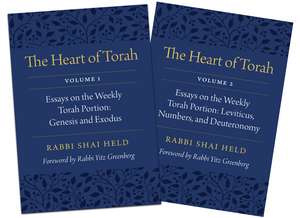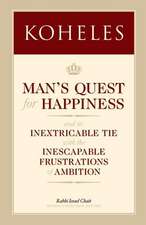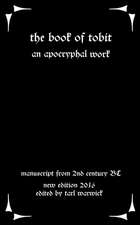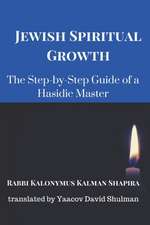The Heart of Torah, Gift Set: Essays on the Weekly Torah Portion
Autor Rabbi Shai Held Cuvânt înainte de Rabbi Irving (Yitz) Greenbergen Limba Engleză Quantity pack – 31 aug 2017
A two-volume hardcover set
In The Heart of Torah, Rabbi Shai Held’s Torah essays—two for each weekly portion—open new horizons in Jewish biblical commentary.
Held probes the portions in bold, original, and provocative ways. He mines Talmud and midrashim, great writers of world literature, and astute commentators of other religious backgrounds to ponder fundamental questions about God, human nature, and what it means to be a religious person in the modern world. Along the way, he illuminates the centrality of empathy in Jewish ethics, the predominance of divine love in Jewish theology, the primacy of gratitude and generosity, and God’s summoning of each of us—with all our limitations—into the dignity of a covenantal relationship.
In The Heart of Torah, Rabbi Shai Held’s Torah essays—two for each weekly portion—open new horizons in Jewish biblical commentary.
Held probes the portions in bold, original, and provocative ways. He mines Talmud and midrashim, great writers of world literature, and astute commentators of other religious backgrounds to ponder fundamental questions about God, human nature, and what it means to be a religious person in the modern world. Along the way, he illuminates the centrality of empathy in Jewish ethics, the predominance of divine love in Jewish theology, the primacy of gratitude and generosity, and God’s summoning of each of us—with all our limitations—into the dignity of a covenantal relationship.
Preț: 490.16 lei
Preț vechi: 532.78 lei
-8% Nou
Puncte Express: 735
Preț estimativ în valută:
93.80€ • 100.30$ • 78.20£
93.80€ • 100.30$ • 78.20£
Carte disponibilă
Livrare economică 27 martie-10 aprilie
Preluare comenzi: 021 569.72.76
Specificații
ISBN-13: 9780827613058
ISBN-10: 0827613059
Pagini: 928
Ilustrații: 2 indexes
Dimensiuni: 152 x 229 x 66 mm
Greutate: 1.49 kg
Editura: The Jewish Publication Society
Colecția The Jewish Publication Society
Locul publicării:United States
ISBN-10: 0827613059
Pagini: 928
Ilustrații: 2 indexes
Dimensiuni: 152 x 229 x 66 mm
Greutate: 1.49 kg
Editura: The Jewish Publication Society
Colecția The Jewish Publication Society
Locul publicării:United States
Notă biografică
Rabbi Shai Held is president, dean, and chair in Jewish Thought at Mechon Hadar and directs its Center for Jewish Leadership and Ideas in New York City. He is the author of Abraham Joshua Heschel: The Call of Transcendence and a recipient of the Covenant Award for excellence in Jewish education. Rabbi Yitz Greenberg is one of the preeminent Jewish thinkers of our time.
Cuprins
VOLUME 1
Foreword
Acknowledgments
A Note on Translations
Introduction
Genesis
Bere’shit No. 1. What Can Human Beings Do, and What Can’t They? Or, Does the Torah Believe in Progress?
Bere’shit No. 2. Created in God’s Image: Ruling for God
Noaḥ No. 1. Before and After the Flood: Or, It All Depends on How You Look
Noaḥ No. 2. People Have Names: The Torah’s Takedown of Totalitarianism
Lekh Lekha No. 1. Are Jews Always the Victims?
Lekh Lekha No. 2. Between Abram and Lot: Wealth and Family Strife
Va-yera’ No. 1. The Face of Guests as the Face of God: Abraham’s Radical and Traditional Theology
Va-yera’ No. 2. In Praise of Protest: Or, Who’s Teaching Whom?
Ḥayyei Sarah No. 1. Isaac’s Search: On the Akedah and Its Aftermath
Ḥayyei Sarah No. 2. People are Complicated: Or, Sensitivity Is a Dangerous Thing
Toledot No. 1. In Praise of Isaac: The Bible’s Paragon of Marital Empathy
Toledot No. 2. Between God and Torah: Judaism’s Gamble
Va-yetse’ No. 1. Can We Be Grateful and Disappointed at the Same Time? Or, What Leah Learned
Va-yetse’ No. 2. No Excuses: Jacob’s Sin and Its Consequences
Va-yishlaḥ No. 1. The Fear of Killing: Jacob’s Ethical Legacy
Va-yishlaḥ No. 2. The Power of Compassion: Or, Why Rachel’s Cries Pierce the Heavens
Va-yeshev No. 1. Against Half-Heartedness
Va-yeshev No. 2. Election and Service: What Joseph Learned
Mikkets No. 1. His Brother’s Brother: Judah’s Journey
Mikkets No. 2. Reuben’s Recklessness: What Disqualifies a Leader?
Va-yiggash No. 1. Humiliation: Judaism’s Fourth Cardinal Sin?
Va-yiggash No. 2. Saving and Enslaving: The Complexity of Joseph
Va-yeḥi No. 1. The Majesty of Restraint: Or, Joseph’s Shining Moment
Va-yeḥi No. 2. Underreacting and Overreacting: Dinah’s Family in Crisis
Exodus
Shemot No. 1. Why Moses? Or, What Makes a Leader?
Shemot No. 2. Gratitude and Liberation
Va-’era’ No. 1. The Journey and the (Elusive) Destination
Va-’era’ No. 2. Cultivating Freedom: When is Character (Not) Destiny?
Bo’ No. 1. Pharaoh: Consumed By the Chaos He Sows
Bo’ No. 2. Receiving Gifts (and Learning to Love?): The “Stripping” of the Egyptians
Be-shallaḥ No. 1. Leaving Slavery Behind: On Taking the First Step
Be-shallaḥ No. 2. Bread From the Sky: Learning to Trust
Yitro No. 1. Does Everyone Hate the Jews? And, Is There Wisdom Outside of Torah?
Yitro No. 2. Honoring Parents: (Sometimes) the Hardest Mitzvah of All
Mishpatim No. 1. Turning Memory Into Empathy: The Torah’s Ethical Charge
Mishpatim No. 2. Hearing the Cries of the Defenseless: Or, We Are All Responsible
Terumah No. 1. Being Present While Making Space: Or, Two Meanings of Tzimtzum
Terumah No. 2. Returning to Eden? An Island of Wholeness in a Fractured World
Tetsavveh No. 1. God in the Mishkan: Present But Not Domesticated
Tetsavveh No. 2. Between Ecstasy and Constancy: The Dynamics of Covenantal Commitment
Ki Tissa’ No. 1. The Importance of Character: Or, Why Stubbornness Is Worse Than Idolatry
Ki Tissa’ No. 2. God’s Expansive Mercy: Moses’s Praise and Jonah’s Fury
Va-yak’hel No. 1. Whom Do We Serve? The Exodus toward Dignified Work
Va-yak’hel No. 2, Pekudei No. 1. (A) Building with Heart
Pekudei No. 2. Building a Home for God
Notes on Genesis
Notes on Exodus
A Note on Bible Commentaries
Bibliography
Subject Index
Classical Sources Index
Foreword
Acknowledgments
A Note on Translations
Introduction
Genesis
Bere’shit No. 1. What Can Human Beings Do, and What Can’t They? Or, Does the Torah Believe in Progress?
Bere’shit No. 2. Created in God’s Image: Ruling for God
Noaḥ No. 1. Before and After the Flood: Or, It All Depends on How You Look
Noaḥ No. 2. People Have Names: The Torah’s Takedown of Totalitarianism
Lekh Lekha No. 1. Are Jews Always the Victims?
Lekh Lekha No. 2. Between Abram and Lot: Wealth and Family Strife
Va-yera’ No. 1. The Face of Guests as the Face of God: Abraham’s Radical and Traditional Theology
Va-yera’ No. 2. In Praise of Protest: Or, Who’s Teaching Whom?
Ḥayyei Sarah No. 1. Isaac’s Search: On the Akedah and Its Aftermath
Ḥayyei Sarah No. 2. People are Complicated: Or, Sensitivity Is a Dangerous Thing
Toledot No. 1. In Praise of Isaac: The Bible’s Paragon of Marital Empathy
Toledot No. 2. Between God and Torah: Judaism’s Gamble
Va-yetse’ No. 1. Can We Be Grateful and Disappointed at the Same Time? Or, What Leah Learned
Va-yetse’ No. 2. No Excuses: Jacob’s Sin and Its Consequences
Va-yishlaḥ No. 1. The Fear of Killing: Jacob’s Ethical Legacy
Va-yishlaḥ No. 2. The Power of Compassion: Or, Why Rachel’s Cries Pierce the Heavens
Va-yeshev No. 1. Against Half-Heartedness
Va-yeshev No. 2. Election and Service: What Joseph Learned
Mikkets No. 1. His Brother’s Brother: Judah’s Journey
Mikkets No. 2. Reuben’s Recklessness: What Disqualifies a Leader?
Va-yiggash No. 1. Humiliation: Judaism’s Fourth Cardinal Sin?
Va-yiggash No. 2. Saving and Enslaving: The Complexity of Joseph
Va-yeḥi No. 1. The Majesty of Restraint: Or, Joseph’s Shining Moment
Va-yeḥi No. 2. Underreacting and Overreacting: Dinah’s Family in Crisis
Exodus
Shemot No. 1. Why Moses? Or, What Makes a Leader?
Shemot No. 2. Gratitude and Liberation
Va-’era’ No. 1. The Journey and the (Elusive) Destination
Va-’era’ No. 2. Cultivating Freedom: When is Character (Not) Destiny?
Bo’ No. 1. Pharaoh: Consumed By the Chaos He Sows
Bo’ No. 2. Receiving Gifts (and Learning to Love?): The “Stripping” of the Egyptians
Be-shallaḥ No. 1. Leaving Slavery Behind: On Taking the First Step
Be-shallaḥ No. 2. Bread From the Sky: Learning to Trust
Yitro No. 1. Does Everyone Hate the Jews? And, Is There Wisdom Outside of Torah?
Yitro No. 2. Honoring Parents: (Sometimes) the Hardest Mitzvah of All
Mishpatim No. 1. Turning Memory Into Empathy: The Torah’s Ethical Charge
Mishpatim No. 2. Hearing the Cries of the Defenseless: Or, We Are All Responsible
Terumah No. 1. Being Present While Making Space: Or, Two Meanings of Tzimtzum
Terumah No. 2. Returning to Eden? An Island of Wholeness in a Fractured World
Tetsavveh No. 1. God in the Mishkan: Present But Not Domesticated
Tetsavveh No. 2. Between Ecstasy and Constancy: The Dynamics of Covenantal Commitment
Ki Tissa’ No. 1. The Importance of Character: Or, Why Stubbornness Is Worse Than Idolatry
Ki Tissa’ No. 2. God’s Expansive Mercy: Moses’s Praise and Jonah’s Fury
Va-yak’hel No. 1. Whom Do We Serve? The Exodus toward Dignified Work
Va-yak’hel No. 2, Pekudei No. 1. (A) Building with Heart
Pekudei No. 2. Building a Home for God
Notes on Genesis
Notes on Exodus
A Note on Bible Commentaries
Bibliography
Subject Index
Classical Sources Index
VOLUME 2
Foreword
Acknowledgments
A Note on Translations
Introduction
Leviticus
Va-yikra’ No. 1. Order Amid Chaos: Connecting to Leviticus
Va-yikra’ No. 2. The Fall and Rise of Great Leaders: Or, What Kind of Leaders Do We Need?
Tsav No. 1. No Leftovers: The Meaning of the Thanksgiving Offering
Tsav No. 2. Buying God Off: Jeremiah and the Problem of Religious Hypocrisy
Shemini No. 1. Is Vegetarianism a Biblical Ideal?
Shemini No. 2. Of Grief Public and Private: Moses and Aaron Face the Unimaginable
Tazria’ No. 1. Living on the Boundary: The Complexity and Anxiety of Childbirth
Tazria’ No. 2, Metsora’ No. 1. Struggling with Stigma: Making Sense of the Metzora
Metsora’ No. 2. Life-Giving, Death-Dealing Words
‘Aḥarei Mot No. 1. Yom Kippur: Purifying the Tabernacle and Ourselves
‘Aḥarei Mot No. 2, Kedoshim No. 1. The Holiness of Israel and the Dignity of the Disabled
Kedoshim No. 2. Loving Our Neighbor: A Call to Emotion and Action
‘Emor No. 1. Covenantal Joy: What Sukkot Can Teach Us
‘Emor No. 2. Between Grief and Anticipation: Counting the Omer
Be-har No. 1. Another World to Live In: The Meaning of Shabbat
Be-har No. 2, Be-ḥukkotai No. 1. God’s Unfathomable Love
Be-ḥukkotai No. 2. Standing Tall: Serving God with Dignity
Numbers
Be-midbar No. 1. Divine Love and Human Uniqueness
Be-midbar No. 2. A Torah for All? Universalism and Its Dangers
Naso’ No. 1. On Channeling and Receiving Blessing
Naso’ No. 2. The Risk of Relationality: Or, Why Confession Matters
Be-ha’alotekha No. 1. It’s Not About You: Or, What Moses Knew
Be-ha’alotekha No. 2. After Pain, Prayer: What Moses (and Job) Can Teach Us
Shelaḥ No. 1. The Tragedy (and Hope) of the Book of Numbers
Shelaḥ No. 2. (Don’t) Follow Your Heart and Your Eyes: Between Numbers and Ecclesiastes
Koraḥ No. 1. Every Jew a High Priest? The Meaning of Tzitzit and the Sin of Korah
Koraḥ No. 2. Giving, Taking, and the Temptations of Leadership
Ḥukkat No. 1. When Everything Starts to Look the Same: Moses’s Failure
Ḥukkat No. 2. Putting Down Ancient Grudges (and Learning Kindness): Between Israel and Edom
Balak No. 1. The Lampooned Prophet: On Learning From (and With) Balaam
Balak No. 2. Not There Yet
Pinḥas No. 1. When Zealotry Metastasizes: The Passionate Self-Regard of Pinhas
Pinḥas No. 2. Between Zealotry and Self-Righteousness: Or, Was Elijah the Prophet Fired?
Mattot No. 1. Cattle, Cattle Everywhere: The Failure of Reuben and Gad
Mattot No. 2, Mase’ei No. 1. Serving God in All We Do: Israel’s Journeys and Resting-Places
Mase’ei No. 2. Do Not Murder! Shedding Innocent Blood and Polluting the Land
Deuteronomy
Devarim No. 1. “Do Not Be Afraid of Anyone”: On Courage and Leadership
Devarim No. 2. A Bolt from the Blue: Or, When God Falls in Love
Va-etḥannan No. 1. Coveting, Craving . . . and Being Free
Va-etḥannan No. 2. A God So Close, and Laws So Righteous: Moses’s Challenge (and Promise)
‘Ekev No. 1. Will and Grace: Or, Who Will Circumcise Our Hearts?
‘Ekev No. 2. Always Looking Heavenward: Learning Dependence
Re’eh No. 1. Opening Our Hearts and Our Hands: Deuteronomy and the Poor
Re’eh No. 2. Women in Deuteronomy—and Beyond
Shofetim No. 1. The Future Is Wide Open: Or, What Prophets Can and Cannot Do
Shofetim No. 2. Give the People (Only Some of) What They Want: Deuteronomy and the King
Ki Tetse’ No. 1. Let Him Live Wherever He Chooses: Or, Why Runaway Slaves Are Like God
Ki Tetse’ No. 2. Combating Cruelty: Amalek Within and Without
Ki Tavo’ No. 1. Against Entitlement: Why Blessings Can Be Dangerous
Ki Tavo’ No. 2. Between Fear and Awe: Forgetting the Self
Nitsavim No. 1. Going in Deep: What It Takes to Really Change
Nitsavim No. 2, Va-yelekh No. 1. Returning to Sinai Every Seventh Year: Equality, Vulnerability, and the Making of Community
Va-yelekh No. 2. Why Joshua? Or, In (Ambivalent) Praise of Hesitancy
Ha’azinu No. 1. “I May Not Get There With You”: The Death of Moses and the Meaning of Covenantal Living
Ha’azinu No. 2. Hearing the Whisper: God and the Limits of Language
Ve-zo’t ha-berakhah No. 1. The Beginning and End of Torah
Notes on Leviticus
Notes on Numbers
Notes on Deuteronomy
A Note on Bible Commentaries
Bibliography
Subject Index
Classical Sources Index
Acknowledgments
A Note on Translations
Introduction
Leviticus
Va-yikra’ No. 1. Order Amid Chaos: Connecting to Leviticus
Va-yikra’ No. 2. The Fall and Rise of Great Leaders: Or, What Kind of Leaders Do We Need?
Tsav No. 1. No Leftovers: The Meaning of the Thanksgiving Offering
Tsav No. 2. Buying God Off: Jeremiah and the Problem of Religious Hypocrisy
Shemini No. 1. Is Vegetarianism a Biblical Ideal?
Shemini No. 2. Of Grief Public and Private: Moses and Aaron Face the Unimaginable
Tazria’ No. 1. Living on the Boundary: The Complexity and Anxiety of Childbirth
Tazria’ No. 2, Metsora’ No. 1. Struggling with Stigma: Making Sense of the Metzora
Metsora’ No. 2. Life-Giving, Death-Dealing Words
‘Aḥarei Mot No. 1. Yom Kippur: Purifying the Tabernacle and Ourselves
‘Aḥarei Mot No. 2, Kedoshim No. 1. The Holiness of Israel and the Dignity of the Disabled
Kedoshim No. 2. Loving Our Neighbor: A Call to Emotion and Action
‘Emor No. 1. Covenantal Joy: What Sukkot Can Teach Us
‘Emor No. 2. Between Grief and Anticipation: Counting the Omer
Be-har No. 1. Another World to Live In: The Meaning of Shabbat
Be-har No. 2, Be-ḥukkotai No. 1. God’s Unfathomable Love
Be-ḥukkotai No. 2. Standing Tall: Serving God with Dignity
Numbers
Be-midbar No. 1. Divine Love and Human Uniqueness
Be-midbar No. 2. A Torah for All? Universalism and Its Dangers
Naso’ No. 1. On Channeling and Receiving Blessing
Naso’ No. 2. The Risk of Relationality: Or, Why Confession Matters
Be-ha’alotekha No. 1. It’s Not About You: Or, What Moses Knew
Be-ha’alotekha No. 2. After Pain, Prayer: What Moses (and Job) Can Teach Us
Shelaḥ No. 1. The Tragedy (and Hope) of the Book of Numbers
Shelaḥ No. 2. (Don’t) Follow Your Heart and Your Eyes: Between Numbers and Ecclesiastes
Koraḥ No. 1. Every Jew a High Priest? The Meaning of Tzitzit and the Sin of Korah
Koraḥ No. 2. Giving, Taking, and the Temptations of Leadership
Ḥukkat No. 1. When Everything Starts to Look the Same: Moses’s Failure
Ḥukkat No. 2. Putting Down Ancient Grudges (and Learning Kindness): Between Israel and Edom
Balak No. 1. The Lampooned Prophet: On Learning From (and With) Balaam
Balak No. 2. Not There Yet
Pinḥas No. 1. When Zealotry Metastasizes: The Passionate Self-Regard of Pinhas
Pinḥas No. 2. Between Zealotry and Self-Righteousness: Or, Was Elijah the Prophet Fired?
Mattot No. 1. Cattle, Cattle Everywhere: The Failure of Reuben and Gad
Mattot No. 2, Mase’ei No. 1. Serving God in All We Do: Israel’s Journeys and Resting-Places
Mase’ei No. 2. Do Not Murder! Shedding Innocent Blood and Polluting the Land
Deuteronomy
Devarim No. 1. “Do Not Be Afraid of Anyone”: On Courage and Leadership
Devarim No. 2. A Bolt from the Blue: Or, When God Falls in Love
Va-etḥannan No. 1. Coveting, Craving . . . and Being Free
Va-etḥannan No. 2. A God So Close, and Laws So Righteous: Moses’s Challenge (and Promise)
‘Ekev No. 1. Will and Grace: Or, Who Will Circumcise Our Hearts?
‘Ekev No. 2. Always Looking Heavenward: Learning Dependence
Re’eh No. 1. Opening Our Hearts and Our Hands: Deuteronomy and the Poor
Re’eh No. 2. Women in Deuteronomy—and Beyond
Shofetim No. 1. The Future Is Wide Open: Or, What Prophets Can and Cannot Do
Shofetim No. 2. Give the People (Only Some of) What They Want: Deuteronomy and the King
Ki Tetse’ No. 1. Let Him Live Wherever He Chooses: Or, Why Runaway Slaves Are Like God
Ki Tetse’ No. 2. Combating Cruelty: Amalek Within and Without
Ki Tavo’ No. 1. Against Entitlement: Why Blessings Can Be Dangerous
Ki Tavo’ No. 2. Between Fear and Awe: Forgetting the Self
Nitsavim No. 1. Going in Deep: What It Takes to Really Change
Nitsavim No. 2, Va-yelekh No. 1. Returning to Sinai Every Seventh Year: Equality, Vulnerability, and the Making of Community
Va-yelekh No. 2. Why Joshua? Or, In (Ambivalent) Praise of Hesitancy
Ha’azinu No. 1. “I May Not Get There With You”: The Death of Moses and the Meaning of Covenantal Living
Ha’azinu No. 2. Hearing the Whisper: God and the Limits of Language
Ve-zo’t ha-berakhah No. 1. The Beginning and End of Torah
Notes on Leviticus
Notes on Numbers
Notes on Deuteronomy
A Note on Bible Commentaries
Bibliography
Subject Index
Classical Sources Index
Recenzii
“The Heart of Torah is a stunning achievement: textually learned, theologically profound, ethically challenging, spiritually uplifting, and psychologically astute. If you want to know what it can mean to read the Torah today with your whole heart and your whole mind, read this book. And then when you’re done, read it again.”—Rabbi Sharon Brous, founder and senior rabbi at Ikar, Los Angeles
“Shai Held deftly brings the wisdom of Torah to bear upon the contemporary human condition. Christians who read this book can discover fresh dimensions within the biblical text, see more clearly where there is common ground between Jews and Christians, and better grasp what it means to understand and live in this world as God’s world.”—Walter Moberly, professor of theology and biblical interpretation at Durham University
“Shai Held is one of the most important teachers of Torah in his generation.”—Rabbi David Wolpe, author of David: The Divided Heart
“Shai Held is an extraordinary figure in the world of Torah. Combining deep knowledge of classical Judaica, wide and insightful reading from the religiously diverse world of biblical and theological scholarship, and a keen sense of the human heart, he has produced a set of essays that people from a wide range of affiliations will find well worth reading and pondering.”—Jon D. Levenson, Albert A. List Professor of Jewish Studies at Harvard Divinity School and author of the National Jewish Book Award–winner Resurrection and the Restoration of Israel: The Ultimate Victory of the God of Life
“Whatever your level of Torah proficiency or your religious outlook, The Heart of Torah will make you think, ask questions, revisit familiar understandings, and gain a new appreciation for the ability of our written and oral tradition to surprise, elevate, and challenge us all. Rabbi Held consistently sheds new light on seemingly familiar texts—his interpretation of ‘an eye for an eye’ is alone worth the price of the volumes—and insistently prods us to become better Jews and better human beings. If you want solid scholarship, you will find it here; if you want religious inspiration, you will find it here, too. That all-too-rare combination makes The Heart of Torah precious indeed.”—Rabbi Asher Lopatin, president of Yeshivat Chovevei Torah Rabbinical School
“The greatest Jewish books arise from authors who combine deep learning in traditional sources with a keen awareness of the intellectual, moral, and spiritual currents of their time and place. Such is Rabbi Shai Held’s breathtaking new commentary on the Torah. Expertly weaving together a tapestry of core stories from the Hebrew Bible with their interpretive trajectories over the ages, he has created a masterful compendium brimming with immediate relevance to the contemporary reader. Wherever you place yourself on the Jewish spectrum—or beyond—you will rise from reading this extraordinary work renewed, challenged, and deepened.”—Rabbi Aaron Panken, president of Hebrew Union College-Jewish Institute of Religion








